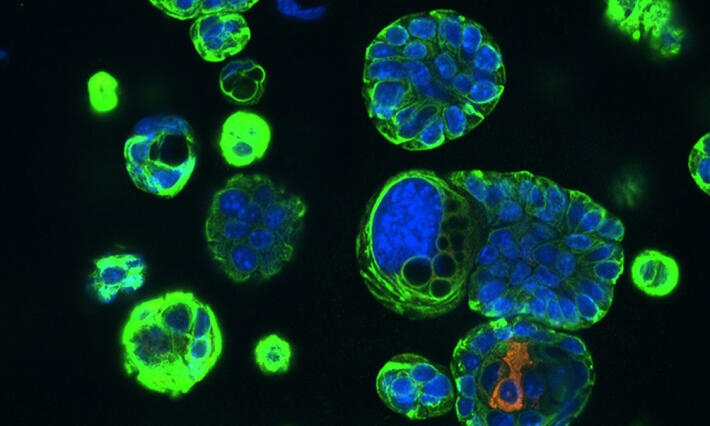Duke Cancer Institute hosted its Sixth Annual Scientific Retreat on Friday, October 25, at Bay 7 in the American Tobacco District in Durham — attracting 166 DCI physicians, researchers, staff, and guests.
Eight up-and-coming scientists who submitted the top abstracts for consideration — two each in the areas of basic, clinical, population and translational science — were given the opportunity to present their outstanding research projects and take questions from their mentors and peers.
Their work included findings related to liposarcoma, salivary gland cancer, breast cancer, uterine cancer, neoantigen vaccines, immunotherapy, chemotherapy and radiation therapy.
Kevin Lin, PhD, who is a post-doc in the Kris Wood Lab and concurrently working on his MD, received the Robert and Barbara Bell Award for Basic Science Cancer Research. He was first up explaining his research project: "Using antagonistic pleiotropy to design a chemotherapy-induced evolutionary trap."
The other awardees were Mark Chen, MD/PhD Candidate with the David Kirsch Lab; Corbin Jacobs, MD, with the Yvonne Mowery Lab; Cosette Champion, an MD Candidate with the Oluwadamilola Fayanju Lab; Tatiana Acosta, MD, MPH, with the Rebecca Previs Lab; Caitlin Marks, BS, with the Jennifer Plichta Lab; Min-Ning Huang, MD, PhD, with the Michael Gunn Lab; and Adam Swartz, PhD, with the Smita Nair Lab.
In a tradition started in 2016, an outstanding DCI faculty member was selected to present their work. Neurosurgeon and DCI faculty member Peter Fecci, MD, PhD, delivered this year's faculty presentation: "Sad, Spent and Sequestered: The Plight of the T cell in Glioblastoma." A neurosurgeon specializing in primary and metastatic brain tumors, Fecci directs the Brain Tumor Immunotherapy Program and the Duke Center for Brain and Spine Metastasis at Duke Cancer Institute.
His talk focused on T-Cell dysfunction in cancer and some phenomena found to be specific to tumors in the brain, whether primary tumors or metastatic tumors from cancers like lung, breast and melanoma. Fecci began with T-Cell exhaustion, a form of dysfunction where T-Cells lose their responsiveness.
"Our group studies why T-Cells are not doing their job in these cancers and why immunotherapies don't work as well in the brain as in other parts of the body or in other cancers," said Fecci. "We've done a lot of work to understand how bad is T-Cell exhaustion in these cancers; it turns out quite bad. We have a lot of insight into how cancers start exhausting T-Cells and how we can make our therapies work better."
The second part of Fecci's talk focused on T-Cell sequestration, a phenomena that he and his group discovered recently where T-Cells can become sequestered in the bone marrow, and, from the tumor's perspective, where they can be trapped and do no harm.
"It behooves tumors to keep T-Cells out of the brain and the brain probably has a mechanism for doing that, which those tumors are able to usurp," said Fecci. "We've uncovered that mechanism. We've begun to find ways to reverse it. We've shown if you get those T-Cells out, now a lot of those immune therapies that didn't work so well before actually work quite well. So, our group is focused on trying to find drugs to help treat this phenomenon and make our immune therapies work better. We spend a lot of time trying to understand what can we do to improve the lives of patients with brain tumors."
The fourth-annual *O. Michael Colvin Memorial Lecture was presented this year by Charles Perou, PhD, the May Goldman Shaw Professor of Molecular Oncology, and co-director of the Computational Medicine Program at UNC Lineberger Comprehensive Cancer Center. His topic, timely for breast cancer awareness month, was on “Quantitative Medicine for Breast Cancer Patients.”
Perou spoke about his work on biomarkers for breast cancer patients using genomic analysis of their tumor specimens. The first part of his talk focused on risk predictors most relevant for ER positive/HER 2 negative patients. The second part focused on triple negative breast cancer patients and the importance of the immune system, including the immune system's response to chemotherapy and the immune system's response to immune therapy.
An awards ceremony to recognize Perou, Fecci, and the eight research project presenters, and to honor Macy Colvin, O. Michael Colvin's widow, was followed by a closing poster session and reception featuring 59 basic, clinical, population and translational science posters and 17 posters showcasing the DCI Shared Resources and Cores.
*Before his loss in 2013, O. Michael Colvin, MD, served as Director Emeritus of the Duke University Comprehensive Cancer Center and Professor Emeritus of Medicine at Duke University School of Medicine. Colvin was a founding senior editor of Molecular Cancer Therapeutics. His many achievements included pioneering work on drugs that damage the genetic material causing cancer cells to replicate. He was one of the first researchers to use high-dose cyclophosphamide to treat solid tumors. Colvin was co-leader of the Duke Cancer Center’s Experimental Research Program. Over the course of his career, he published more than 150 scientific articles. Begun in 2015, the O. Michael Colvin Memorial Lecture has been a featured highlight at every DCI Scientific Retreat since.





